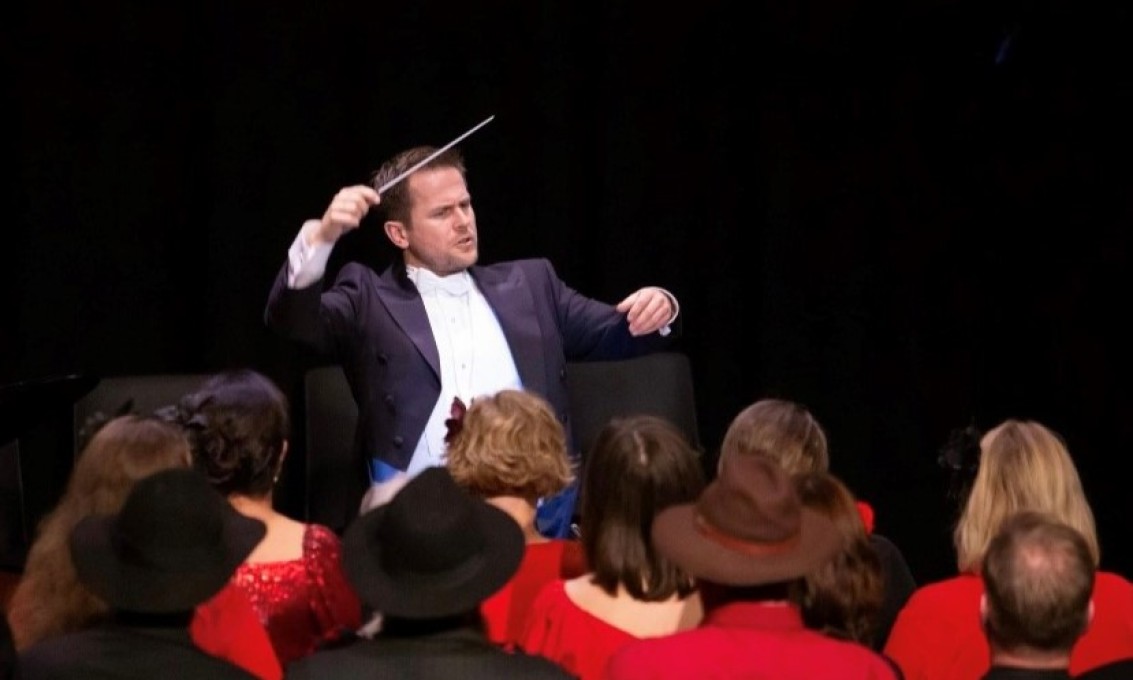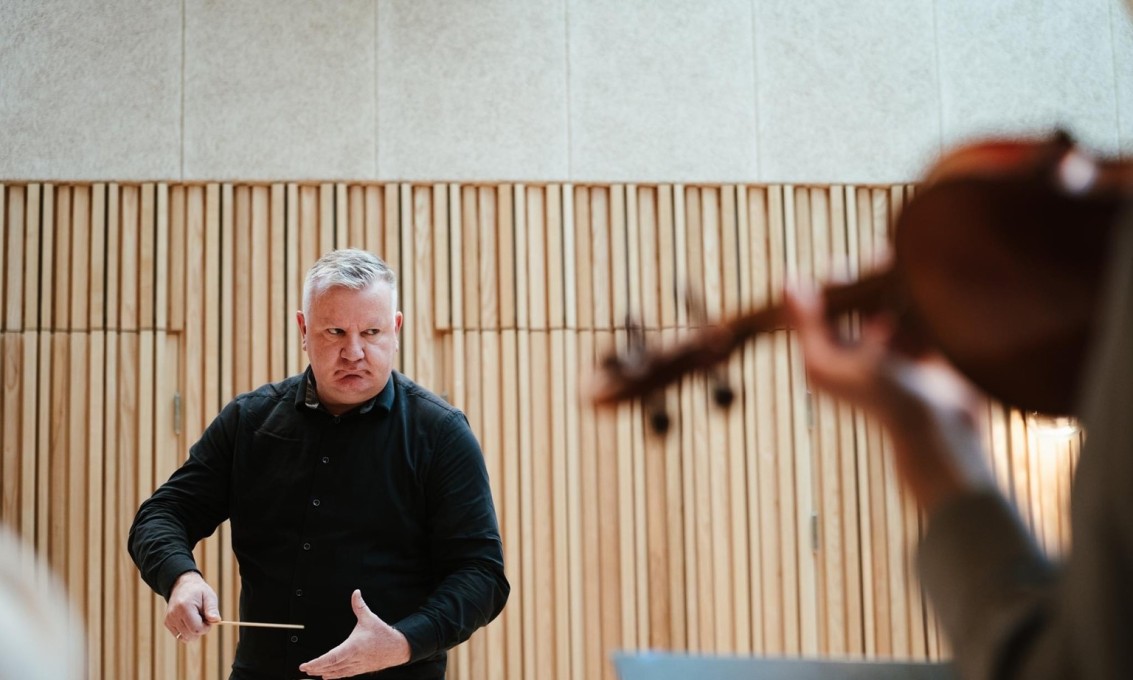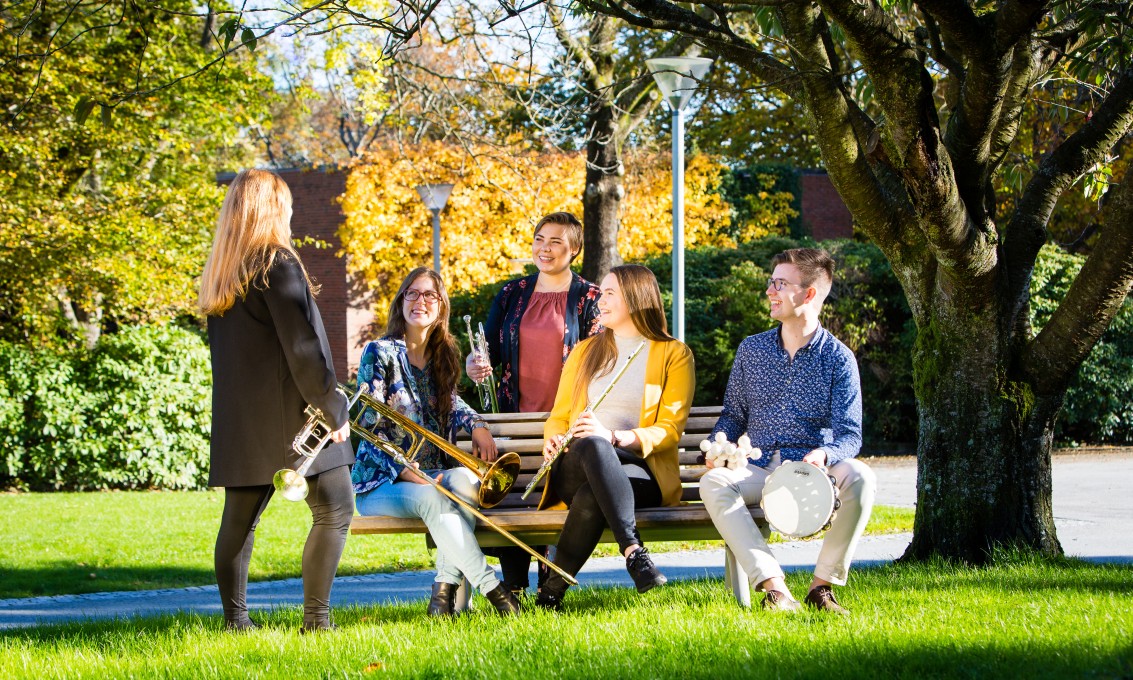ConductIT is a study programme designed to offer flexible conducting training to music students, music educators and music professionals. The programme consists of a number of individual courses in conducting. Each course represents a profile or specialization within conducting; fundamentals of conducting, orchestral conducting, wind and brass band conducting, school band conducting or choral conducting.
1 year. It is possible to undertake the program several times with different courses.
10 or 30
10 - 15
English and Norwegian
Video
1 March Local admission
Application opens from 1 January
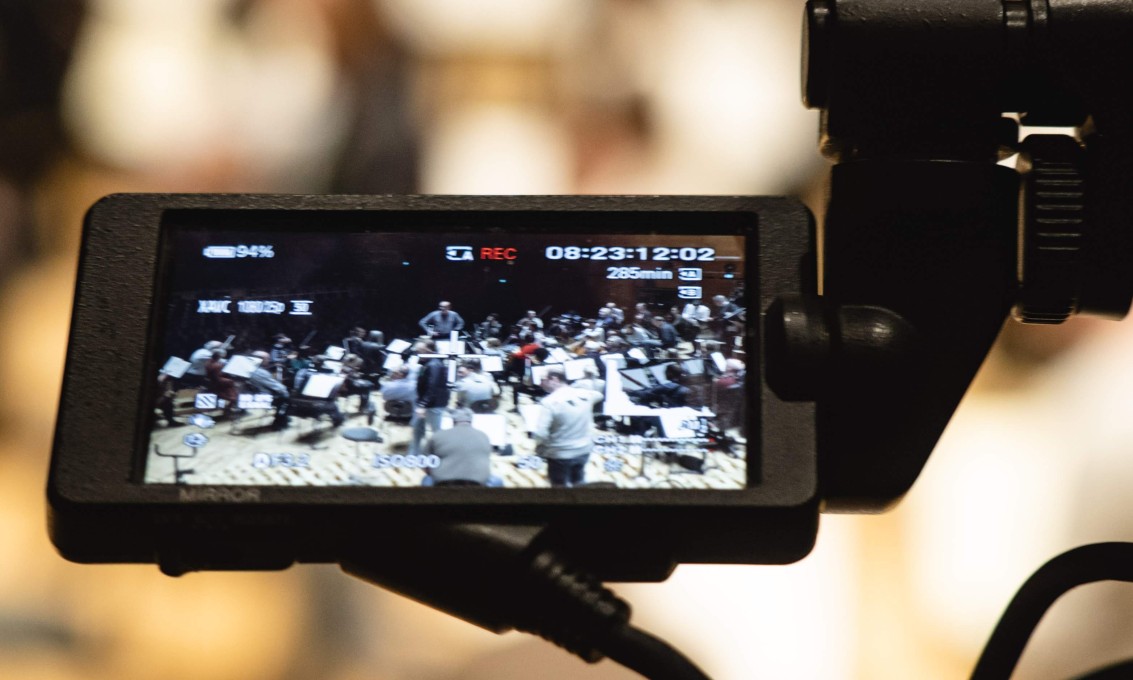
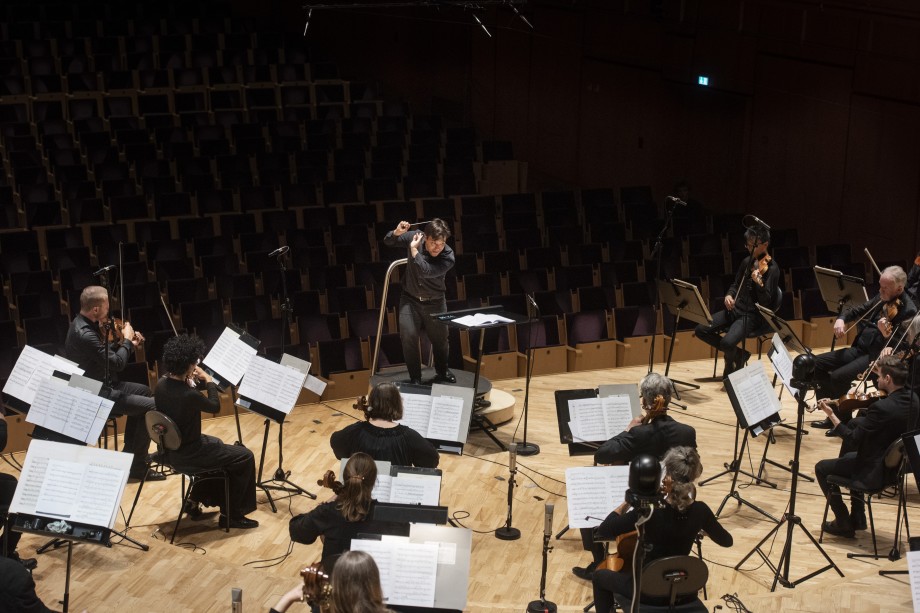

About the Study
ConductIT is a study programme designed to offer flexible conducting training to music students, music educators and music professionals.
The ConductIT study programme consists of a number of individual courses in conducting. Each course represents a profile or specialization within conducting. With the exception of the general introductory course ConductIT Intro, all specialization courses are offered in two levels. Level two will normally require the student to first complete level one of the same specialization. The introductory course ConductIT Intro is not mandatory.
The concept is that the student can choose one or several courses as building blocks in developing their own competence, according to their goals, interests, and prior knowledge. For some, taking only one course is ideal. For others, it will be useful to undertake several of the ConductIT courses over time. Only one course can be taken at a time.
Courses in the ConductIT study programme are subject to a sufficient number of applicants for each specific course to be realized. The faculty may cancel announced courses if there are not sufficient participants.
ConductIT courses overview
The ConductIT courses are part-time and are flexible, making them possible to combine with work or other studies.
All ConductIT courses are flexible and are designed to allow studying from home, wherever that may be, geographically. Much of the teaching and studying is organized online to facilitate this. However, the courses also include a small number of on-campus sessions, where the student must be physically present.
NB: ConductIT Intro is running over one semester. All other courses are running over two semesters (one academic year). All courses start in August.
| INTRODUCTION LEVEL (optional) |
|---|
| VCI101 ConductIT Intro. Fundamentals of conducting (10 ETCS) |
With the exception of the general introductory course ConductIT Intro, all specialization courses are offered in two levels. All courses listed below give 30 ETCS.
| Level 1 | Level 2 |
|---|---|
| VCI102 ConductIT Orchestral conducting | VCI202 ConductIT Orchestral conducting |
| VCI103 ConductIT Wind and Brass Band conducting | VCI203 ConductIT Wind and Brass Band conducting |
| VCI104 ConductIT School Band conducting | VCI204 ConductIT School Band conducting |
| VCI105 ConductIT Choral conducting | VCI205 ConductIT Choral conducting |
ConductIT courses consist of these main activities:
- Online individual lessons in all courses - with the exception of the course VCI101*
- Self-study of online learning material at www.conductit.eu, and from other sources, with associated written assignments
- On-campus events; participation at the conducting course Dirigentuka in August in Stavanger, plus weekend in-person sessions (as defined in each course description)
*VCI101 ConductIT Intro does not include individual lessons
More information regarding the number of on-campus sessions for each subject, as well as other admission requirements, can be found under subjects descriptions and study programme description.
Final dates for the on-campus sessions for the academic year 2025/2026 are published under "practice sessions" below on this page.
General qualification requirements
- Upper Education Entrance Qualification (Norw. GSK/“Generell studiekompetanse”). International applicants must document this according to the GSU list (General study skills for foreign applicants).
- English language proficiency is required for admission to the ConductIT study program. For the courses School Band conducting, level 1 & 2, Scandinavian language proficiency is recommended.
In addition, there are specific required prerequisite knowledge qualifications for each of the individual courses in the program. These qualifications are evaluated by the faculty audition committee. Please refer to the individual course study plans for details. Final admission to the study program and its courses is decided by the dean of the Faculty of Performing Arts. Only one course of the ConductIT program can be followed at any given time - it is not possible to combine two or more ConductIT courses during the same academic year.
Read more about admission requirements.
All study programmes affiliated with the Faculty of Performing Arts are under annual revisions. Revised study plans and course descriptions for the academic year 2024/2025 will be published here on 1 February 2024.
Meet two of this year's ConducIT students
Learning outcomes
All study programmes at UiS have defined goals for what you will learn during the course of study. Read more about the learning outcomes for this study programme.
After completing and passing the examination for the courses in ConductIT, candidates will have acquired the knowledge, skills and general proficiency that will enable them to:
General proficiency
- Display a good understanding of the conductor’s role and function in rehearsal and concert situations and as a leader
- Set goals for their own learning and development as a conductor and leader
- Set goals for the ensembles they conduct
Knowledge
- To know common conducting techniques and beat patterns
- To understand principles of effective rehearsal
- To understand key theoretical concepts in repertoire preparation
- To identify main qualities of leadership required of a conductor
Skills
- To perform communicative and clear conducting technique
- To conduct quality rehearsals
- To prepare repertoire efficiently
How to apply for ConductIT
To apply for admission at the Faculty of Performing Arts, you must apply through local SøknadsWeb.
The application process for ConductIT is administered by the central admissions office at UiS.
For questions related to application and admission, please send and e-mail to opptak@uis.no.
Please note! All information under ''How to apply - Step by step'' will be updated by 1 January. Information published before 1 January is from the previous application period.
When can I apply?
Søknadsweb is open from 1 January - 1 March.
The secondary admission is open from 15 April to 15 May - only if there are vacancies after the primary admission.
- Apply through Søknadsweb and submit the Specification form within 1 March
- What course suits you best? Read the section "Courses overview - which one to chose?" below
- Check programme's requirements for admission and required documents under "Admission requirements for ConductIT" section below
- In order for your application to be considered for admission, it is required that all the necessary application documents are uploaded in SøknadsWeb, and that the Specification form is completed within the application deadline
- After completing your registration in SøknadsWeb you will receive a receipt to your e-mail where you can find a link to the Specification form. Fill out and complete the Specification form within the deadline
- Include a motivation letter and a musical CV in the application form. The CV must contain an overview of what you have done up to now, as a performing musician and conductor
- Applicants to ConductIT-subjects on level I and II must submit a 10-minute video recording of themselves while conducting an ensemble/group of musicians.
The video link(s) must be shared in the Specification form within the deadline - Applicants to ConductIT-subjects on level I and II must present a plan for their access to an ensemble/band for the course of study the; do it in the Specification form
- Start planning video recording early. Read more under ''Guidelines audition video for ConductIT''
- Incomplete applications will be withdrawn
- You will receive the result of your application during April
Who can apply for ConductIT?
All ConductIT subjects are taught in English. Please check language requirements criteria and possible exemptions before applying. For the courses School Band conducting, level 1 & 2, Scandinavian language proficiency is recommended (but not required).
Applicants with citizenship from outside of the EU/EEA and Switzerland are required to pay the tuition fee at the University of Stavanger. We advise you to read about the possiblity for exemptions from paying tuition fee.
Note!
- For all the applicants to any of 6 subjects on level I and II, it is a prerequisite that applicants have access to an ensemble to conduct during the entire study.
The Specification form - What to submit?
- Personalia - name, address, phone etc.
- Supplementary information on your choice of subject(s)
- CV - information about your musical and educational career
- Motivation letter
- Audition video - link to video audition (read more about requirements under "Guidelines audition video for ConductIT")
Application documents - What to upload in SøknadsWeb?
- Final transcript and final diploma from your upper secondary education
- Applicants with education from outside Norway must check entrance requirements for admission to upper education depending on their country.
- Copy of passport or national ID (valid at the time of application): picture, name and nationality must be visible and clear.
- Proof of English language proficiency
*If you plan on taking the language test after the application deadline, please upload a copy of your test registration receipt with ETS TOEFL/IELTS Academic/PTE Academic/Cambridge English Qualifications as a PDF to Søknadsweb within the application deadline - References/recommendations (not mandatory)
If the upper secondary education is to be completed in the spring the same year as you apply, confirmation from the educational institution and a preliminary transcript of grades must be uploaded in Søknadsweb.
If the documentation is not in Norwegian, Danish, Swedish or English, it must be officially translated into English. Both translations and originals must be uploaded in the same PDF file.
File format
All documentation uploaded in SøknadsWeb must be PDF-files. All attachments you upload should be a picture of your original documents (do not scan copies). We do not accept documents by e-mail. Your documents must be up to date. A check of the original diploma may be initiated at the beginning of the term.
NB: Random tests and checks of original diplomas will be carried out at the start of studies.
General study qualification
Nordic applicants are required to have completed upper secondary school and achieved general qualification for university entrance (GSK).
International applicants must provide documentation of general eligibility for university entrance according to the GSU list (Higher Education Entrance Qualification).
Prior learning
Alternatively, applicants aged 25 years and older, without documentable upper education entrance qualifications, may request to have their qualifications assessed on the basis of prior learning. This entails, for example, all acquired skills accumulated through paid or unpaid work, continuing education, leisure activities or other. Applications for prior learning must be well documented.
English language requirement
As a general requirement for admission to ConductIT, all applicants must document proficiency in English on advanced level through an international test, recognized by the University of Stavanger. UiS does not offer any preparatory courses in English. Please see English language requirements for detailed information regarding required score.
It is not a requirement to have Norwegian language proficiency, however for the courses School Band conducting, level 1 & 2, Scandinavian language proficiency is recommended. This is due to conducting practice with Norwegian youth and it is advantageous to speak and understand Norwegian or another Scandinavian language.
Exceptions for language requirements are made on the basis of the dean's decision.
Documentation of professional experience
Applicants for all 7 different ConductIT courses must attach a letter of motivation in the Specification form. For applicants to level I or II courses, the letter of motivation should also include personal development goals.
In addition, applicants must provide documentation of previous experience as a musician and conductor in a CV. The CV should be uploaded in the Specification form by the application deadline.
Applicants to ConductIT Intro:
The applicants must show in the CV that they have a basic general musical competence, such as music reading skills and experience in ensemble performance, for instance obtained through prior training or education or through practice as a performer, educator, conductor, composer or similar.
Applicants to Orchestral conducting I and II:
Level 1 applicants must show in the CV that they have general musicianship training and prior experience in the orchestral genre, for instance through prior training or education or through practice as a performer, educator, conductor, composer or similar.
Level 2 applicant must normally have completed and passed the course Orchestral conducting, level 1.
Applicants to Wind and Brass Band conducting I and II:
Level 1 applicants must show that they have general musicianship training and prior experience in the wind and brass band genre, for instance through prior training or education or through practice as a performer, educator, conductor, composer or similar.
Level 2 applicant must normally have completed and passed the course Wind and Brass Band conducting, level 1.
Applicants to School Band conducting I and II:
Level 1 applicants must show that they have general musicianship training and prior experience in the school band genre, for instance through prior training or education or through practice as a performer, educator, conductor, composer or similar.
Level 2 applicant must normally have completed and passed the course School Band conducting, level 1.
Video evaluation
Applicants to 6 of 7 different ConductIT courses (except ConductIT Intro) are asked to provide a 10-minutes video recording of themselves conducting an ensemble/brass band/group of musicians. Read below "Guidelines audition video for ConductIT".
Who are offered admission?
The head of department appoints an academic commission, which evaluates and ranks all applicants. The head of department and academic commission evaluates the applicants as qualified/not qualified based on the academic commission's evalutaion and rankings, submitted own work and application documents. Final admission is decided by the dean.
Qualified applicants are then offered a study place to the extent that there are available places on the applied study programme. If the faculty has more qualified applicants than the admission framework indicates that we can offer, the applicants are put on a waiting list based on the commission's ranking list.
If the faculty has available study places after primary admission has been completed, secondary admission will be opened from approx. April 15.
See supplementary rules for admission in the admission regulations in the article further down.
The ConductIT study program consists of a number of individual courses in conducting. Each course represents a profile or specialization within conducting; fundamentals of conducting, orchestral conducting, wind and brass band conducting or school band conducting.
NB! Only one course of the ConductIT program can be followed at any given time - it is not possible to combine two or more ConductIT courses during the same academic year.
Here is a short description of each on the courses:
ConductIT Intro
ConductIT Intro is a one-semester, 10 ETCS course in fundamentals of conducting. Students must participate at Dirigentuka in Stavanger in August, complete the ConductIT MOOC, and attend one final weekend on-campus in Stavanger in the fall.
Orchestral conducting I
ConductIT - Orchestral conducting, level 1 is a course for students who already have experience in the field of music performance, for instance as performers, educators, or conductors and who seek a course in orchestral conducting. The course of study involves several different topics, e.g. conducting practice, conducting technique and theory, as well as entrepreneurship and career development.
The conducting practice will consist of UiS-organized sessions on-campus (Dirigentuka – five days in August, two or three weekend sessions on-campus) and home assignments where students are expected to facilitate access to their own conducting practice at home, organized by the student. This is resolved either by the student collaborating with local ensembles, or by organizing small practice ensembles (a minimum of 3-4 musicians are required). The number of such sessions is to be set by agreement between teacher and student. Many students are already conductors of one or more ensembles, in which case using them as a home practice ensemble is a good solution.
The website www.conductit.eu contains a wide array of study materials on conducting. In this course the students will study selected chapters of the material and will be required to submit associated written assignments.
Students who complete and pass ConductIT - orchestral conducting, level 1 may apply for the course ConductIT - orchestral conducting, level 2.
Orchestral conducting II
ConductIT - Orchestral conducting, level 2 is a course for students who already have substantial experience in the field of music performance, for instance as performers, educators, or conductors and who seek a course in orchestral conducting. The course of study involves several different topics, e.g. conducting practice, conducting technique and theory, as well as entrepreneurship and career development.
The conducting practice will consist of UiS-organized sessions on-campus (Dirigentuka – five days in August, two or three weekend sessions on-campus) and home assignments where students are expected to facilitate access to their own conducting practice at home, organized by the student. This is resolved either by the student collaborating with local ensembles, or by organizing small practice ensembles (a minimum of 3-4 musicians are required). The number of such sessions is to be set by agreement between teacher and student. Many students are already conductors of one or more ensembles, in which case using them as a home practice ensemble is a good solution.
The website www.conductit.eu contains a wide array of study materials on conducting. In this course the students will study selected chapters of the material and will be required to submit associated written assignments.
Wind and Brass Band conducting I
ConductIT - Wind and Brass Band conducting, level 1 is a course for students who already have experience in the field of music performance, for instance as performers, educators, or conductors and who seek a course in wind and brass band conducting. The course of study involves several different topics, e.g. conducting practice, conducting technique and theory, as well as entrepreneurship and career development.
The conducting practice will consist of UiS-organized sessions on-campus (Dirigentuka – five days in August, two or three weekend sessions on-campus) and home assignments where students are expected to facilitate access to their own conducting practice at home, organized by the student. This is resolved either by the student collaborating with local ensembles, or by organizing small practice ensembles (a minimum of 3-4 musicians are required). The number of such sessions is to be set by agreement between teacher and student. Many students are already conductors of one or more ensembles, in which case using them as a home practice ensemble is a good solution.
The website www.conductit.eu contains a wide array of study materials on conducting. In this course the students will study selected chapters of the material and will be required to submit associated written assignments.
Students who complete and pass ConductIT - Wind and Brass Band conducting, level 1 may apply for the course ConductIT - Wind and Brass Band conducting, level 2.
Wind and Brass Band conducting II
ConductIT - Wind and Brass Band conducting, level 2 is a course for students who already have substantial experience in the field of music performance, for instance as performers, educators, or conductors and who seek a course in wind and brass band conducting. The course of study involves several different topics, e.g. conducting practice, conducting technique and theory, as well as entrepreneurship and career development.
The conducting practice will consist of UiS-organized sessions on-campus (Dirigentuka – five days in August, two or three weekend sessions on-campus) and home assignments where students are expected to facilitate access to their own conducting practice at home, organized by the student. This is resolved either by the student collaborating with local ensembles, or by organizing small practice ensembles (a minimum of 3-4 musicians are required). The number of such sessions is to be set by agreement between teacher and student. Many students are already conductors of one or more ensembles, in which case using them as a home practice ensemble is a good solution.
The website www.conductit.eu contains a wide array of study materials on conducting. In this course the students will study selected chapters of the material and will be required to submit associated written assignments.
School Band conducting I
ConductIT - School Band conducting, level 1 is a course for students who already have experience in the field of music performance, for instance as performers, educators, or conductors and who seek a course in school band conducting. The course of study involves several different topics, e.g. conducting practice, conducting technique and theory, as well as entrepreneurship and career development.
The conducting practice will consist of UiS-organized sessions on-campus (Dirigentuka – five days in August, two or three weekend sessions on-campus) and home assignments where students are expected to facilitate access to their own conducting practice with an ensemble that is relevant for this course, at home and organized by the student. The number of such sessions is to be set by agreement between teacher and student. Many students are already conductors of one or more ensembles, in which case using them as a home practice ensemble is a good solution.
The websites www.conductit.eu and http://digitaleskolekorps.uis.hopto.me/ contain a wide array of study materials on conducting. In this course the students will study selected chapters of the material and will be required to submit associated written assignments.
Students who complete and pass ConductIT - School Band conducting, level 1 may apply for the course ConductIT - School Band conducting, level 2.
School Band conducting II
ConductIT - School Band conducting, level 2 is a course for students who already have substantial experience in the field of music performance, for instance as performers, educators, or conductors and who seek a course in school band conducting. The course of study involves several different topics, e.g. conducting practice, conducting technique and theory, as well as entrepreneurship and career development.
The conducting practice will consist of UiS-organized sessions on-campus (Dirigentuka – five days in August, two or three weekend sessions on-campus) and home assignments where students are expected to facilitate access to their own conducting practice with an ensemble that is relevant for this course, at home and organized by the student. The number of such sessions is to be set by agreement between teacher and student. Many students are already conductors of one or more ensembles, in which case using them as a home practice ensemble is a good solution.
The websites www.conductit.eu and http://digitaleskolekorps.uis.hopto.me/ contain a wide array of study materials on conducting. In this course the students will study selected chapters of the material and will be required to submit associated written assignments.
Choral conducting I
Information will be published here.
Choral conducting II
Information will be published here.
There are planned several practical sessions in Stavanger for each subject. Specific dates for the academic year 2024/2025 will be published by 01.02.2024.
On-campus sessions for ConductIT Express:
- Dirigentuka: week 32 | 5 - 9 August 2024
- Examen week-end: week 45 | 8 - 10 November 2024
On-campus sessions for Orchestral conducting I and II:
- Dirigentuka: week 32 | 5 - 9 August 2024
- October session: week 43 | 25 - 27 October 2024
- January session: week 3 | 17 - 19 January 2025
- Examen week-end: week 19 | 9 - 11 May 2025
On-campus sessions for Wind and Brass Band conducting I and II:
- Dirigentuka: week 32 | 5 - 9 August 2024
- November session: week 46 | 15 - 17 November 2024
- January session: week 2 | 10 - 12 January 2025
- Examen week-end: week 21 | 23 - 25 May 2025
On-campus sessions for School Band conducting I and II:
- Dirigentuka: week 32 | 5 - 9 August 2024
- January session: week 2 | 10 - 12 January 2025
- Examen week-end: week 21 | 23 - 25 May 2025
NB: changes might apply
Registration for the Dirigentuka
All students who have accepted a study place at ConductIT must register themselves for the Dirigentuka via NMF website. When registering, choose the 'Conductor Course' In the registration, specify the subject you have been accepted for. NMF will then place students in the correct group. Scores must be ordered individually of the participant.
There is no charge for the Dirigentuka; the participation fee is covered by the University of Stavanger.
Video requirements*
As a part of the application process to ConductIT, you will be asked to submitt a 10-minute video recording of you conducting an ensemble/group of musicians.
* requirements are applied to applicants to the following subjects: Orchestral conducting level 1 and 2, Wind and Brass Band conducting level 1 and 2, School Band conducting level 1 and 2.
- Information about how to submitt a video link can be found in the Specification form
- The video link(s) must be submitted in the Specification form within the deadline 1 March
- We do not accept audio files
- We only accept Youtube-links
- The audition video must be up to date and no older than 1 November, 2023.
Tip
Start recording rehearsals and/or concerts well in advance of the application deadline. Choose one or two excerpts where you think you had a good flow in the instruction or a nice 'run through' that you can submit. We are not so concerned with how it sounds, but it is more about how you affect the singers/musicians and the music through both instruction and technique. Recordings from rehearsals will do just fine, it doesn't necessarily have to be from a concert.
Remember!
Remember to film so that we see your face, i.e. set up the camera behind the ensemble, or from the side. Be sure to check that the audio is ok and that you have uploaded the file to YouTube with the settings that give us permission to play it.
NB: We can not guarantee that the entire recorded video material will be viewed by the commission.
Admission letter, Rejection letter or Waiting list letter will be published in SøknadsWeb under ''My applications''. You will receive an e-mail when the results are ready.
If you fail to submit a successful application to the faculty within the deadline, your application will be withdrawn from the system.
If you have any questions about your offer, refusal or waiting list place, you can send us an e-mail to opptak@uis.no.
Remember to reply
If you are offered letter of admission or waiting list letter you must remember to reply ''Yes'' or ''No'' in SøknadsWeb within the mentioned deadline. Information regarding deadline is shared in the admission letter/waiting list letter.
Students from outside of the European Economic Area (EEA) and Switzerland who start their studies in autumn 2024 are required to pay tuition fees at the University of Stavanger. Read more about the tuition fee.
1. Scope of the regulations
The regulations apply to admission to the ConductIT study programme, an education in conducting for 10 or 30 ECTS credits at the Faculty of Performing Arts, Universiy of Stavanger.
The programme has three levels:
- ConductIT Intro - an introduction course in conducting. 10 ECTS credits
- A fundamental course in conducting with specializations in orchestra, brass band, and school band. 30 ECTS credits.
- An advanced course in conducting with specializations in orchestra, brass band, and school band. 30 ECTS credits.
The study programme is open for applicants from the Nordic countries and international applicants.
The admission regulations for ConductIT are based on the Act relating to Universities and University Colleges (the Universities and University Colleges Act) of April 1, 2005, § 3-6, p. 7, and FOR-2007-01-31-173: Regulation on Admission to Higher Education, as well as the Regulation on Admission to Studies and Courses at the University of Stavanger of October 18, 2018, §1-1."
2. Basis for admission
2.1 Applicants for ConductIT, must document completed upper secondary education.
Applicants with education from outside Norway must check entrance requirements for admission to upper education depending on their country.
Alternatively, applicants aged 25 and above, without documented upper secondary education, may request an assessment of their qualifications based on practical experience. The applicant must turn 25 in the year they apply for admission.
Applicants with higher education as their only application basis may be considered for admission.
2.2 English language requirements must be met in accordance with entrance requirements for admission to upper education . Exceptions to language requirements are granted based on decisions by the dean.
2.3 A motivation letter and a CV describing the applicant's experience as a performing musician and conductor must be included with the application. Applicants for level 2 courses must provide documentation of completed level 1 courses or their equivalents.
2.4 A 10-minute video recording of the applicant conducting an ensemble of at least 5 individuals must be submitted as part of the documentation.
2.5 It is a prerequisite that the student has access to an ensemble or group of musicians to conduct throughout the entire course of study.
2.6 Sections 2.4 and 2.5 do not apply to applicants for the ConductIT Intro course.
3. Appointment of Committees
3.1 The head of department appoints an academic commission for admission.
3.2 The commission is responsible for:
- assessing qualifications based on application documents
- evaluating qualifications based on submitted video recordings (not applicable to applicants for the ConductIT Intro course)
- ranking applicants (see point 4)
3.3 The commission presents the results to the head of department.
4. Ranking
4.1 Applicants are ranked according to specific criteria established by the commission based on their professional evaluation.
4.2 If the faculty has more qualified applicants than the admission capacity allows, applicants are placed on a waiting list according to the commission's ranking.
5. Admission
5.1 The Evaluation of formalities and basic competence is conducted by administrative personnel responsible for admission.
5.2 The evaluation of a complete application with a video, and further consideration for admission, is carried out by the academic commission.
5.3 The academic commission proposes admissions to the head of department, who then recommends admissions to the dean based on an overall assessment of the number of available study places and economical implications. Final admissions are decided by the dean.
The proposal for admission is based on:
- The commission's assessment and ranking
- Other resource considerations
5.4 In case of more vacant study places after the primary admission process, the head of department may decide whether to open the program for a secondary admission round. Additional admissions can also be made by the head of department, with the final decision by the dean.
5.5 Digital conductor studies for choir and ConductIT courses cannot be combined in the same academic year. It is also not possible to combine multiple ConductIT courses in the same academic year.
6. Offer of Admission
6.1 Applicants are notified of offers, waitlist status, or rejections.
6.2 If an applicant does not confirm acceptance of an offered study place within the specified deadline, the spot will be offered to another qualified applicant.
6.3 Commencement of study programs and courses is subject to conditions such as group size and economical considerations.
7. Right to appeal
7.1 Decisions made under the authority of this regulation can be appealed, according to the Administrative Procedures Act, §28 to §32. The deadline for filing an appeal is 3 weeks from the day the admission results are published or 3 weeks after receiving any explanation, if provided.
7.2 Appeals regarding individual decisions related to admissions for programmes not covered by the Centralised Admission System will be handled by the Appeals Board at the University of Stavanger, in accordance with the Act on Universities and Colleges, §5-1.
7.3 Appeals concerning formal errors in admissions will initially be processed by the faculty. If the faculty's original decision is upheld and the applicant chooses to maintain the appeal, the appeal will be forwarded to the university's appeals board. According to §28 and §29 of the Administrative Procedures Act, decisions can be appealed in writing within 3 weeks after the date of receiving the letter. The appeal should be sent to the University of Stavanger.
Adopted by the Study Programme Committee/Faculty of Performing Arts on October 28, 2021. Last revised and adopted by the Study Portfolio Committee/Faculty of Performing Arts on November 21, 2023.
Where there are linguistic differences the Norwegian version is the official version.
FAQ
Can I work and study at the same time? What kind of software do I need to join the online study programme?
I live in Stavanger. Can I access class-rooms at Campus Bjergsted?
You can access the rooms only during the on-campus sessions related to your study.
Can I study and work at the same time?
Sure. As long as you deliver all the work expected from you as a part of the study programme and you meet to all of on-campus sessions.
I live outside of Stavanger and I wonder if it would be possible to get a student accommodation at the Campus?
Unfortunately, all students apartments are reserved to full-time students.
What kind of soft- and hardware do I need to be able to follow the courses with distance-learning?
You need a normal laptop with a camera and a headset. All students at the University of Stavanger get free access to the Office 365, it includes all the necessary tools for communication with your teacher and fellow students.
Can I combine ConductIT with another full-time study programme at another University?
Yes. As long as you deliver all required works and projects for ConductIT.
Contact us
Do you have any questions about the application process and/or admission, please get in touch by email: opptak@uis.no
Study offer from the Faculty of performing arts
We offer different studies, from One Year Programme and Bachelor's Degree to Extension Studies, Master's Degree and Postgraduate Diploma in performing Arts.
In addition, there are many one year programme as Practical Pedagogical Education, Music Production and Recording, distance learning programmes in conducting (ConductIT) and Jazz. (DigJazz).
